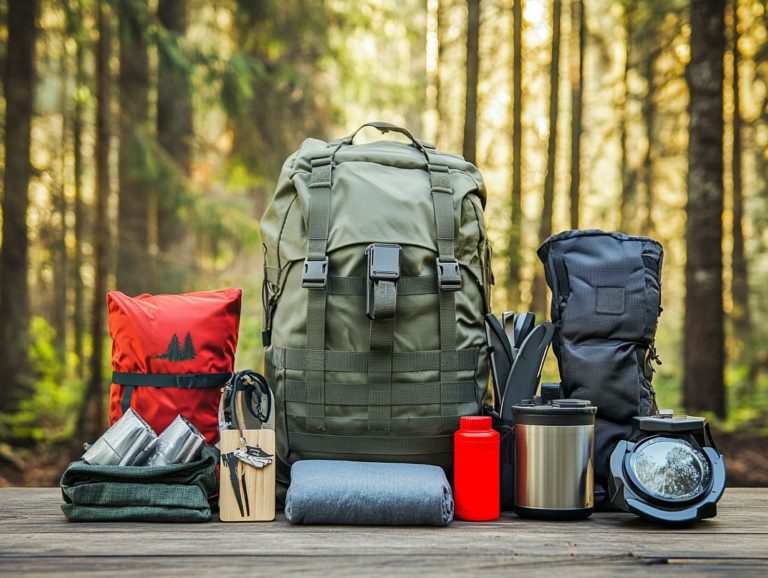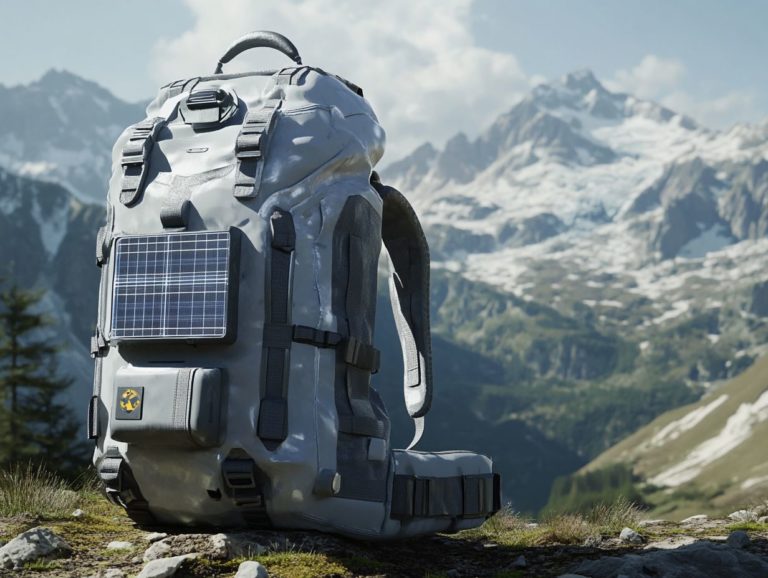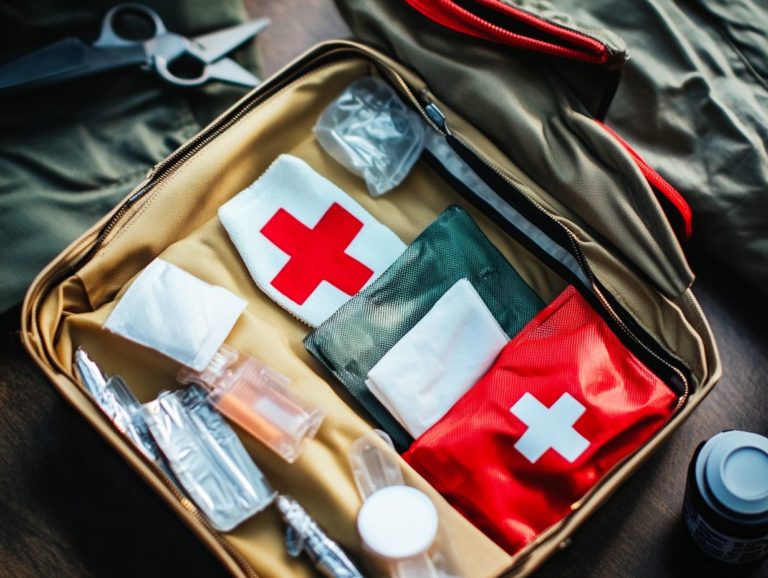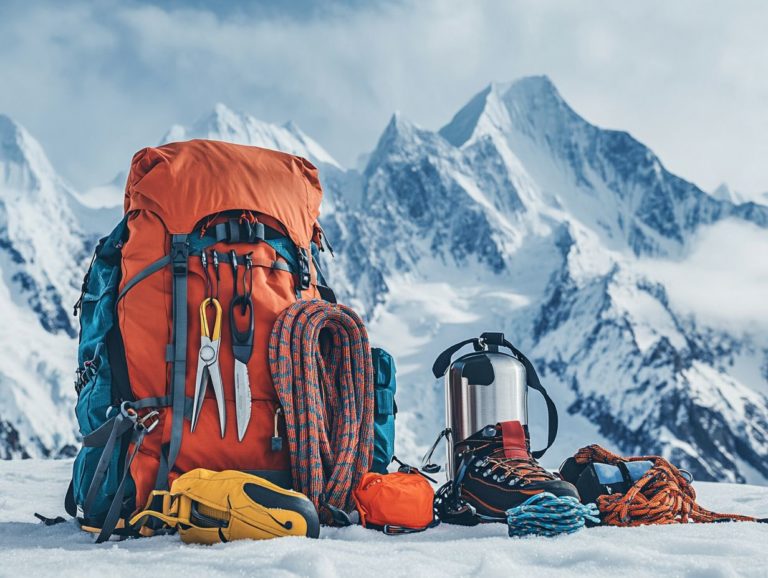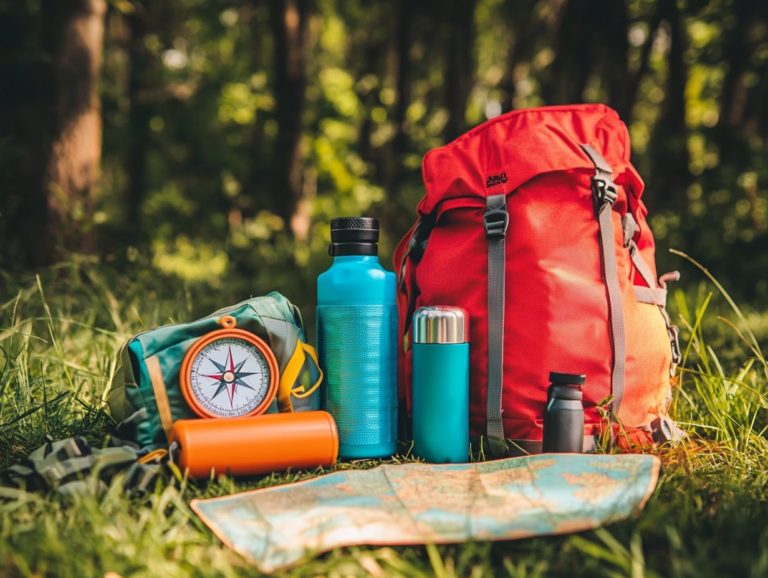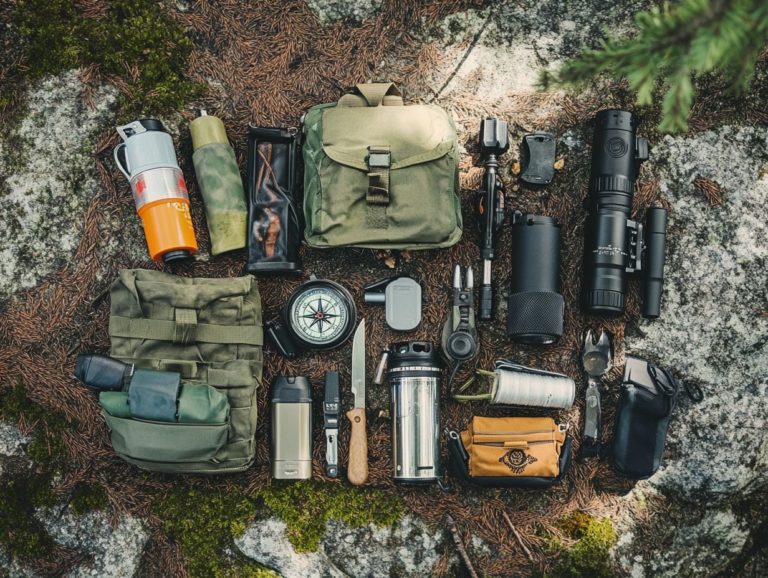Survival Gear for Family Camping Trips
Planning a family camping trip can spark an exhilarating sense of adventure. However, it also presents unique challenges, particularly when packing the right gear.
From ensuring everyone has a cozy spot to rest to having essential cooking supplies, each item is vital to your outdoor experience.
This guide clearly lists the must-have items for a successful camping trip. You ll find practical tips on organization, emergency preparedness, and enjoyable extras that elevate your adventure.
Whether you’re a camping expert or trying it for the first time, you ll find insights to make your family outing memorable and stress-free.
Contents
- Key Takeaways:
- 1. Shelter and Sleeping Gear
- 2. Cooking and Food Supplies
- 3. Clothing and Personal Items
- 4. First Aid Kit and Medications
- 5. Navigation and Communication Tools
- 6. Lighting and Fire Starting Tools
- 7. Tools and Equipment for Outdoor Activities
- 8. Emergency and Survival Gear
- 9. Hygiene and Sanitation Supplies
- 10. Entertainment and Comfort Items
- 11. Pet Supplies (If Bringing a Pet)
- 12. Repair and Maintenance Items
- 13. Extra Batteries and Power Sources
- 14. Extra Cash and Important Documents
- 15. Emergency Contact Information and Plan
- What Are the Essential Items for Family Camping Trips?
- Frequently Asked Questions
- What is considered essential survival gear for family camping trips?
- Are there any specific items to consider when packing survival gear for family camping trips?
- Is it necessary to pack survival gear for family camping trips even if we’re staying at a campsite?
- What should I look for when purchasing a water filtration system for family camping trips?
- Can I use my phone as a compass during a family camping trip?
- Do I need to bring a first aid kit if I’m already carrying a multi-purpose knife?
Key Takeaways:
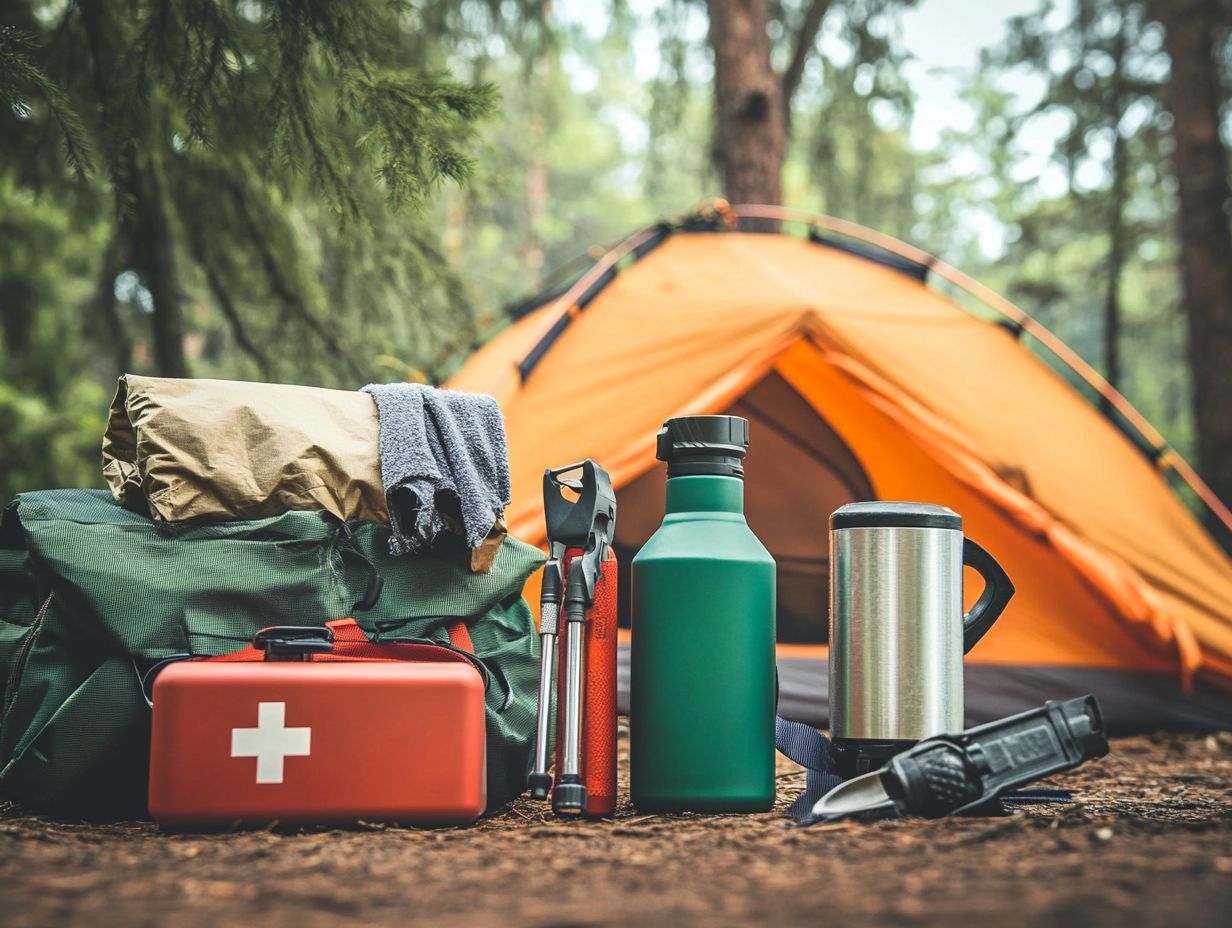
- Always pack a first aid kit and necessary medications for emergencies.
- Bring tools for outdoor activities and a communication device for safety.
- Pack hygiene and sanitation supplies, as well as extra batteries and power sources.
1. Shelter and Sleeping Gear
Choosing the right shelter and sleeping gear is essential for a comfortable camping experience. This includes various tent options, rooftop tents, cozy sleeping bags, and sturdy tent stakes.
Making informed choices about these essentials enhances your experience. For example, rooftop tents provide stunning views and keep you above ground moisture and critters.
When selecting sleeping bags, pay attention to temperature ratings to keep warm during chilly nights. Sturdy tent stakes are crucial for anchoring your shelter against the wind.
Organizing these items into a clear checklist streamlines packing and ensures no essential gear is overlooked. This sets the stage for a relaxed camping getaway.
2. Cooking and Food Supplies
Equipping yourself with the right cooking and food supplies enhances your camping experience. Meal preparation becomes an enjoyable outdoor adventure.
Portable stoves are a must-have, offering flexible cooking options wherever you pitch your tent. Pair them with solid cooking utensils like spatulas, pots, and cutting boards for efficient meal prep.
Quality food storage solutions like airtight containers and coolers keep ingredients fresh and deter wildlife. Stick to simple recipes and prep ingredients at home to save time outdoors.
Remember to pack extra ice packs for your cooler to keep food at safe temperatures. This way, you can enjoy every moment in nature without worry.
3. Clothing and Personal Items
Selecting the right clothing and personal items is crucial for a successful camping trip. The appropriate gear protects against unpredictable weather and enhances comfort.
Choose clothes that draw sweat away to keep everyone dry. A high-quality waterproof jacket is essential for unexpected rain showers.
Sturdy footwear provides vital support for hiking and rugged terrain. A waterproof tarp acts as a barrier against rain and dew, keeping your gear dry.
Packing efficiently is important. Organizing personal items in waterproof bags streamlines your setup for a smooth camping experience.
4. First Aid Kit and Medications
A well-stocked first-aid kit is an absolute essential on your camping checklist. It offers peace of mind and enhances safety by ensuring you’re ready for minor injuries or emergencies while you embrace the great outdoors.
As you prepare for a family adventure in nature, customize your first-aid kit to address your specific needs. Essential components to include are:
- Adhesive bandages
- Antiseptic wipes
- Gauze pads for treating cuts and scrapes
- Elastic bandage for sprains
Don t forget to pack essential medications for quick relief! Include ibuprofen for pain relief, antihistamines for allergic reactions, and a digital thermometer. Create an emergency plan. It is crucial to ensure safety by familiarizing everyone with the nearest medical facilities and outlining the steps to take in case of a serious situation.
This way, you can ensure a swift response and maintain safety for all family members.
5. Navigation and Communication Tools
Having reliable navigation and communication tools is essential for any camping trip, allowing you to explore safely and stay connected, even in remote areas where cell service might be spotty.
Understanding how to use these tools effectively can elevate your outdoor experience. Maps provide a timeless way to visualize the terrain, while a compass serves as a trustworthy guide to help you find your way.
GPS devices offer real-time location tracking but depend on batteries and signals that can be fickle in the wilderness. Incorporating communication tools like walkie-talkies or satellite phones ensures you can reach out to others, especially in emergencies.
For peace of mind, keep these devices charged and within easy reach. You’re always prepared for whatever surprises your outdoor adventures might throw your way!
6. Lighting and Fire Starting Tools
Essential lighting and fire-starting tools are vital for your family camping trip. They create a safe and enjoyable atmosphere while providing the means to cook and stay warm after sunset.
Reliable light sources like headlamps and lanterns enhance your safety by illuminating paths and minimizing the risk of accidents. They also enrich your camping experience by creating a cozy ambiance around your site.
Effective fire-starting tools think waterproof matches, lighters, and fire starters are essential for igniting campfires, preparing meals, or simply staying warm on chilly nights.
It s equally important to adopt safety measures, such as maintaining a safe distance from flammable materials and keeping a bucket of water or sand nearby. This way, your vital tools contribute to a secure and enjoyable camping adventure.
7. Tools and Equipment for Outdoor Activities
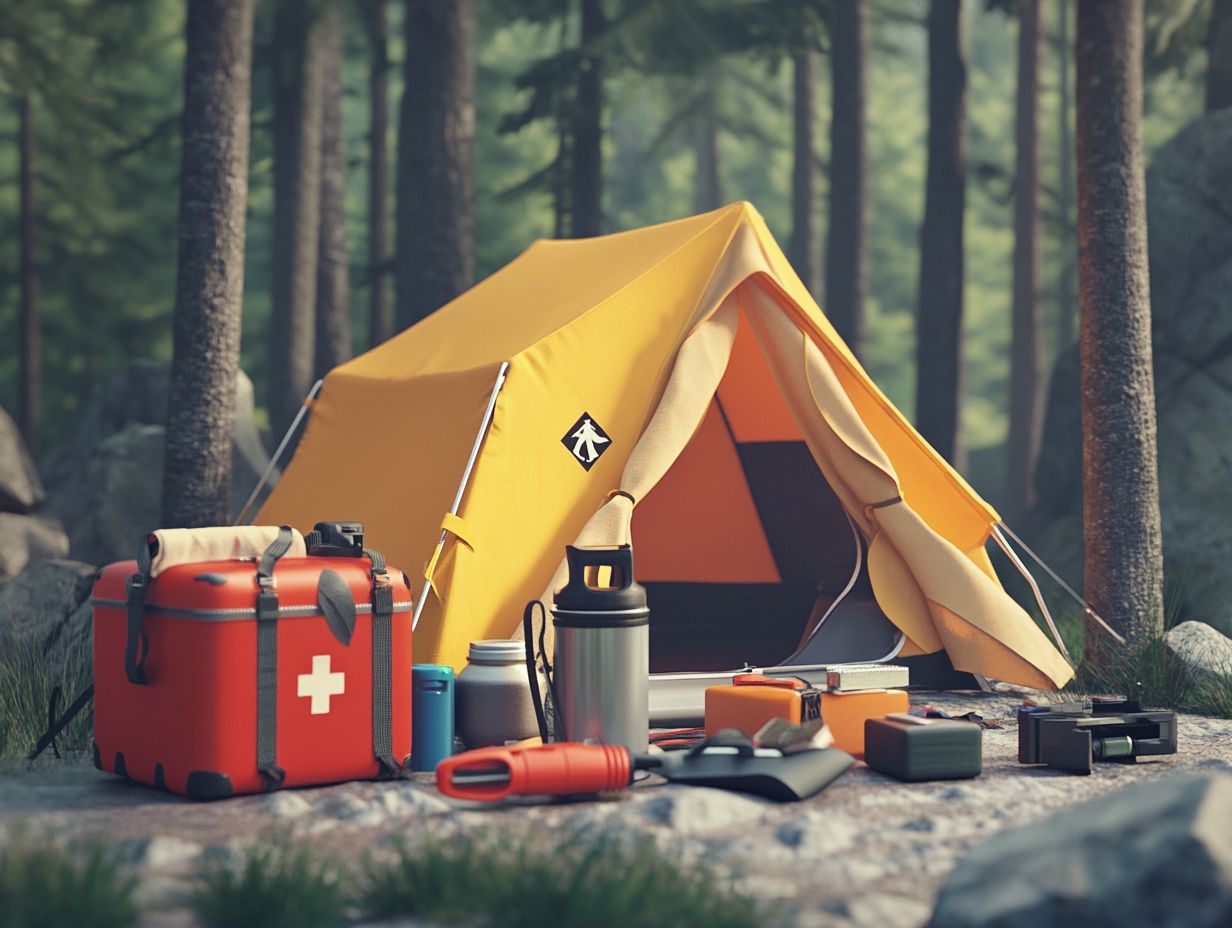
Equipping yourself with the right tools and equipment for outdoor activities can significantly elevate your family’s camping experience. It opens the door to a range of adventures from hiking and fishing to cooking and survival scenarios.
To ensure you re prepared for whatever nature throws your way, consider including versatile items like a multi-tool. This trusty companion can assist with numerous tasks, from opening cans to making minor repairs.
A sturdy survival knife is another essential. Its multiple functions whether cutting rope or prepping food can prove invaluable in the great outdoors.
A compact digging tool is also practical for digging, whether you re setting up a campsite or need to create a fire pit. When packing these tools, opt for a designated, accessible pouch and ensure each item is securely stowed to prevent any accidents during transit. This way, your family will be well-prepared for an enjoyable and safe outdoor adventure.
8. Emergency and Survival Gear
Emergency and survival gear is essential for your camping checklist. It ensures you and your family are prepared for unexpected situations while enjoying the great outdoors.
The right gear can turn a potential crisis into a manageable adventure! A well-stocked survival kit should include vital essentials like:
- First-aid supplies
- Multi-tools
- Emergency blankets
Integrating a reliable water filtration system into your camping gear is crucial. It ensures you have safe drinking water and minimizes the risk of dehydration or illness. Additionally, considering the top 10 essential gear for family hikes can enhance your outdoor experience.
Learning camping hacks can be invaluable. For example, mastering how to securely store food keeps curious wildlife at bay, while knowing the best methods for building a safe campfire is essential.
Conduct mock drills to maximize your gear’s effectiveness. This way, everyone in your group knows how to use the equipment and respond effectively in an emergency.
9. Hygiene and Sanitation Supplies
Staying clean and healthy while camping is crucial for everyone s comfort. Pack the right hygiene supplies as part of your camping essentials.
When venturing into the great outdoors, especially for longer stays, equip yourself with environmentally friendly soap, eco-friendly toilet paper, and other sanitation products. These items help prevent the spread of germs and protect the environment.
Set up a dedicated camping hygiene station away from cooking and sleeping zones. Consider bringing a portable sink or a large watertight container filled with water for hand washing.
Having a small trash bag for waste and opting for compostable options when available helps keep the campsite clean while ensuring everyone stays healthy.
10. Entertainment and Comfort Items
Including entertainment and comfort items in your camping checklist can significantly enhance your experience. It transforms family camping trips from mere survival quests into delightful opportunities for enjoyment and relaxation in nature.
To make the most of these outings, pack a variety of entertainment options. Engaging your family with books can spark imaginative storytelling around the campfire, while board games offer lighthearted competition outdoors.
Don t forget about outdoor activities like hiking or fishing to keep everyone active and exploring. Comfort items, such as camp chairs, provide a cozy retreat after a day of adventures, and portable high chairs simplify mealtime, especially for families with toddlers.
These thoughtful additions ensure everyone can unwind while cherishing quality time together, creating memories that resonate long after the trip ends.
11. Pet Supplies (If Bringing a Pet)
Bringing a pet on your family camping trip can be rewarding, but it requires careful planning and the right supplies for a safe and enjoyable adventure.
Choosing the right gear is essential. Start with adequate food and water supplies to keep your pet nourished and hydrated. A portable water bowl and high-quality pet food that s easy to pack can make a difference.
A comfortable shelter, like a pet-friendly tent or an adjustable pet crate, protects your furry friend from the elements while offering a cozy spot for relaxation.
Include safety items such as a sturdy leash and a pet identification tag. Consider using natural deterrents to keep them safe from wildlife.
By prioritizing these essentials, you create a delightful environment for your pet to explore and thrive in the great outdoors.
12. Repair and Maintenance Items
Including repair and maintenance items in your camping checklist is essential for ensuring the longevity and functionality of your gear throughout your outdoor adventures.
To prepare effectively, pack vital items such as:
- Duct tape for quick fixes that save the day.
- Extra stakes to secure your camping shelters against the whims of nature.
- A small toolkit for any necessary equipment repairs that may pop up.
Before you head out, conducting a thorough maintenance check is crucial. This means inspecting your tent for tears, checking your sleeping bag for zipper functionality, and making sure your stove is in tip-top shape.
While on your trip, routinely check the condition of your gear. Addressing any issues promptly enhances your camping experience and gives you peace of mind, knowing you’re fully prepared for whatever challenges the great outdoors may throw your way.
13. Extra Batteries and Power Sources
Have you ever been stuck in the dark during a camping trip? Packing extra batteries and reliable power sources is essential to keep your camping gear fully operational, especially for lighting and communication devices.
Without a dependable power supply, you risk being left in the dark at critical moments. Lanterns and headlamps are vital for nighttime visibility, while electronic devices are crucial for navigation and emergency communication.
Choose batteries that work with your equipment and select long-lasting batteries for maximum longevity. Consider alternative power sources like solar chargers for an eco-friendly option. Portable power banks help keep your devices charged while you’re on the move.
Planning ahead and packing these vital items sets the stage for a safe and enjoyable experience for everyone involved.
14. Extra Cash and Important Documents
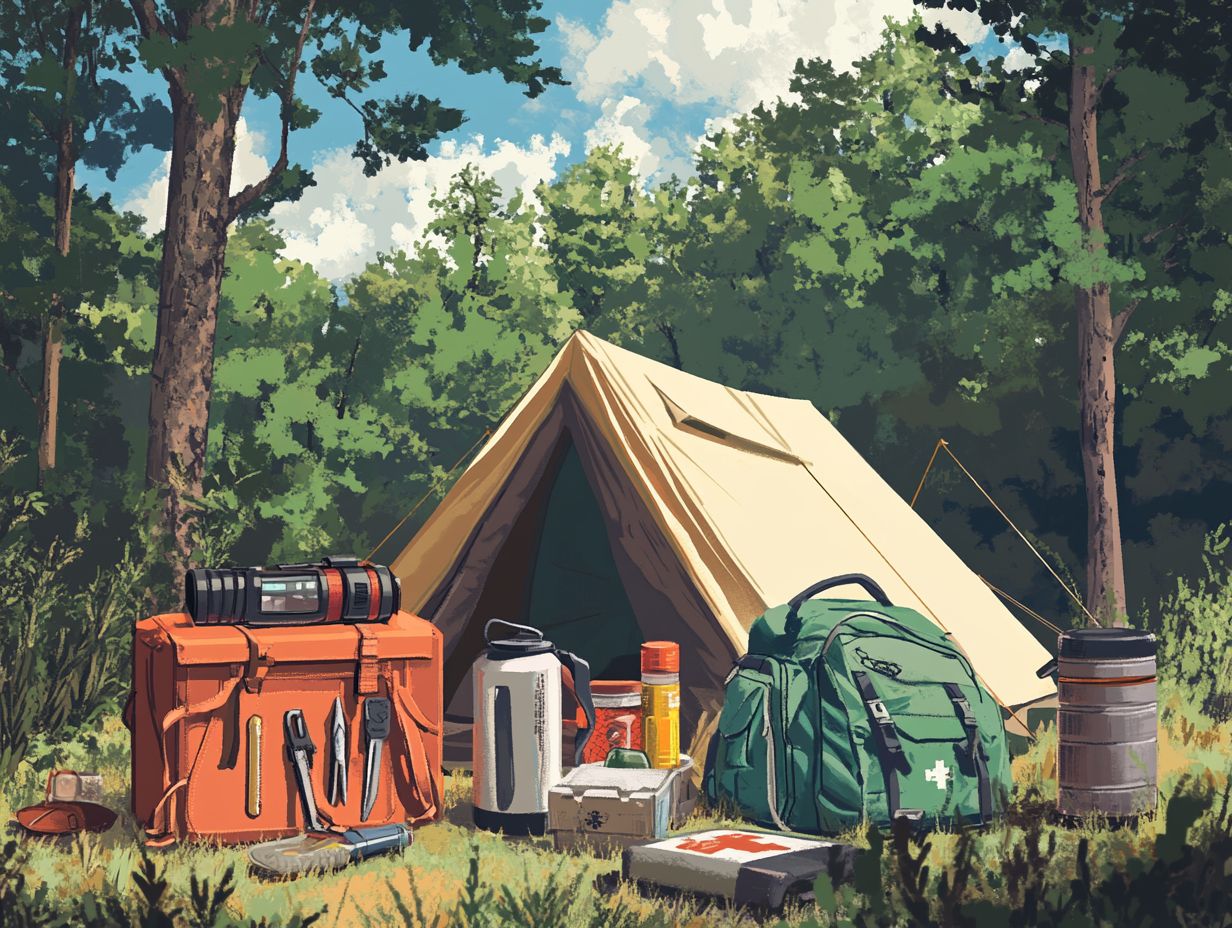
Having extra cash and important documents while camping is crucial for various situations, from unexpected costs to safety and identification requirements.
For example, packing a valid ID, health insurance information, and any necessary medical documentation can significantly reduce stress and save time in emergencies. In remote areas, cash is essential, as many establishments may not accept cards. This makes having cash on hand vital for purchasing supplies or accessing essential services.
To keep your valuables secure while enjoying nature, consider using waterproof bags or pouches. Store them in a concealed, hard-to-reach spot within your campsite. Staying organized by designating a specific location for these items ensures you have peace of mind throughout your adventure.
15. Emergency Contact Information and Plan
Planning ahead gives you peace of mind and helps keep your family safe. Preparing an emergency contact information list and a well-thought-out camping plan is essential for your family’s safety while camping.
Your emergency contact list should include not only immediate family members but also close friends, local authorities, and nearby campgrounds. This ensures help can be reached swiftly if the need arises. Be sure to specify your camping location and the duration of your stay; this information greatly assists rescue teams in locating you should an unforeseen incident occur.
Before you set off on your adventure, share this vital information with a trusted individual who will remain at home. This allows them to keep an eye on your plans and initiate prompt intervention if necessary. Remember, preparation and communication are the cornerstones of a worry-free experience in the great outdoors.
Pack these essentials today to ensure your family is ready for anything nature throws at you!
What Are the Essential Items for Family Camping Trips?
Family camping trips can be a truly delightful experience when you’re equipped with the essential items that ensure your safety and comfort. These items elevate your enjoyment of the great outdoors, making a well-thought-out camping checklist absolutely vital for success.
As you embark on these adventures, carefully categorizing your necessary gear becomes crucial. Think about grouping items like shelter tents, sleeping bags, and ground mats. Then follow with your cooking supplies, which should include portable stoves, utensils, and non-perishable foods. To ensure you’re well-equipped, consider the top features to look for in camping gear. Don’t forget personal items like first-aid kits, insect repellent, and clothing that can handle unpredictable weather changes.
By prioritizing organization and proper planning, you can alleviate common camping stressors. This allows your family to focus on creating unforgettable memories while exploring nature’s beauty together. To ensure you have the right supplies, check out the best camping gear for spring trips. With a thorough checklist in hand, you’ll feel confident that you’ve packed everything you need for a successful trip.
What Are Some Tips for Packing and Organizing Survival Gear?
Efficiently packing and organizing your survival gear can transform your family camping trip. Smart preparation and insightful camping tips turn potentially stressful moments into manageable challenges.
To ensure that all essential items are readily accessible when needed, categorize your gear by type or function. For example, group your first aid supplies, cooking tools, and shelter equipment separately. Make sure to label each section clearly.
A well-structured inventory system saves you time and allows for a quick assessment of what you have versus what might be missing. Consider creating a checklist tailored to specific survival items based on your camping environment whether it’s a lush forest, a scorching desert, or rugged mountains to streamline your packing process.
This approach empowers your family to adapt their gear according to the unique challenges posed by your chosen location. You’ll be comprehensively prepared for any situation that may arise.
How Can Families Prepare for Emergency Situations?
Getting ready for emergencies can be an adventure in itself! Preparing for emergency situations is a key part of family camping that guarantees your safety and peace of mind.
To prepare effectively, begin by crafting a comprehensive emergency contact list. This should include local emergency numbers and a clear way to reach each family member if you happen to get separated.
Engaging in open discussions about safety protocols is essential. It enhances awareness and ensures everyone knows exactly what to do in various scenarios whether it’s a sudden shift in weather or an unexpected wildlife encounter.
Take some time to familiarize everyone with the camping area. Highlight nearby trails, water sources, and potential hazards to empower your family with essential knowledge. By investing effort into proactive planning and choosing the best camping gear for family outings, you can cherish your camping experience with confidence and peace of mind.
What Are Some Common Mistakes to Avoid When Packing for a Camping Trip?
Avoiding common mistakes when packing for your camping trip is crucial for ensuring a seamless and enjoyable experience. Proper preparation can save you from unnecessary stress and discomfort during your outdoor adventure.
Many campers tend to overlook essential items like a first aid kit or enough food supplies. This can lead to inconvenient situations when you’re miles away from the nearest store.
Then there’s the issue of overpacking, which not only weighs down your backpack but also complicates setups. This makes it difficult to locate necessary gear when you need it most.
Neglecting organizing your backpack’s weight evenly can lead to discomfort while hiking, dampening your overall experience. To tackle these challenges, it s wise to create a detailed checklist before you head out. Pack only the essentials and employ packing techniques that ensure even weight distribution.
By checking and double-checking all your gear, you can eliminate those last-minute scrambles and truly enjoy your time in the great outdoors. Get started on your checklist today and make your next camping trip unforgettable!
What Are Some Non-Essential but Useful Items for a Family Camping Trip?
While certain items are essential for your family camping trip, consider adding a few non-essential yet surprisingly useful items that can elevate your comfort and enjoyment. These items can turn the experience into something truly memorable.
Consider portable games to keep the kids entertained. They allow you to unwind and enjoy the natural beauty without feeling the need for constant supervision.
Extra seating options, like portable chairs or inflatable loungers, can make your campsite more comfortable. They provide a cozy haven to kick back after a full day of activities.
Don’t underestimate the benefits of travel pillows. They can significantly improve your sleep quality in a tent, making it easier for you to recharge for the adventures that await the next day.
A small portable speaker can transform your campsite! It can turn a simple evening into a vibrant gathering under the stars, filled with music and laughter.
Frequently Asked Questions
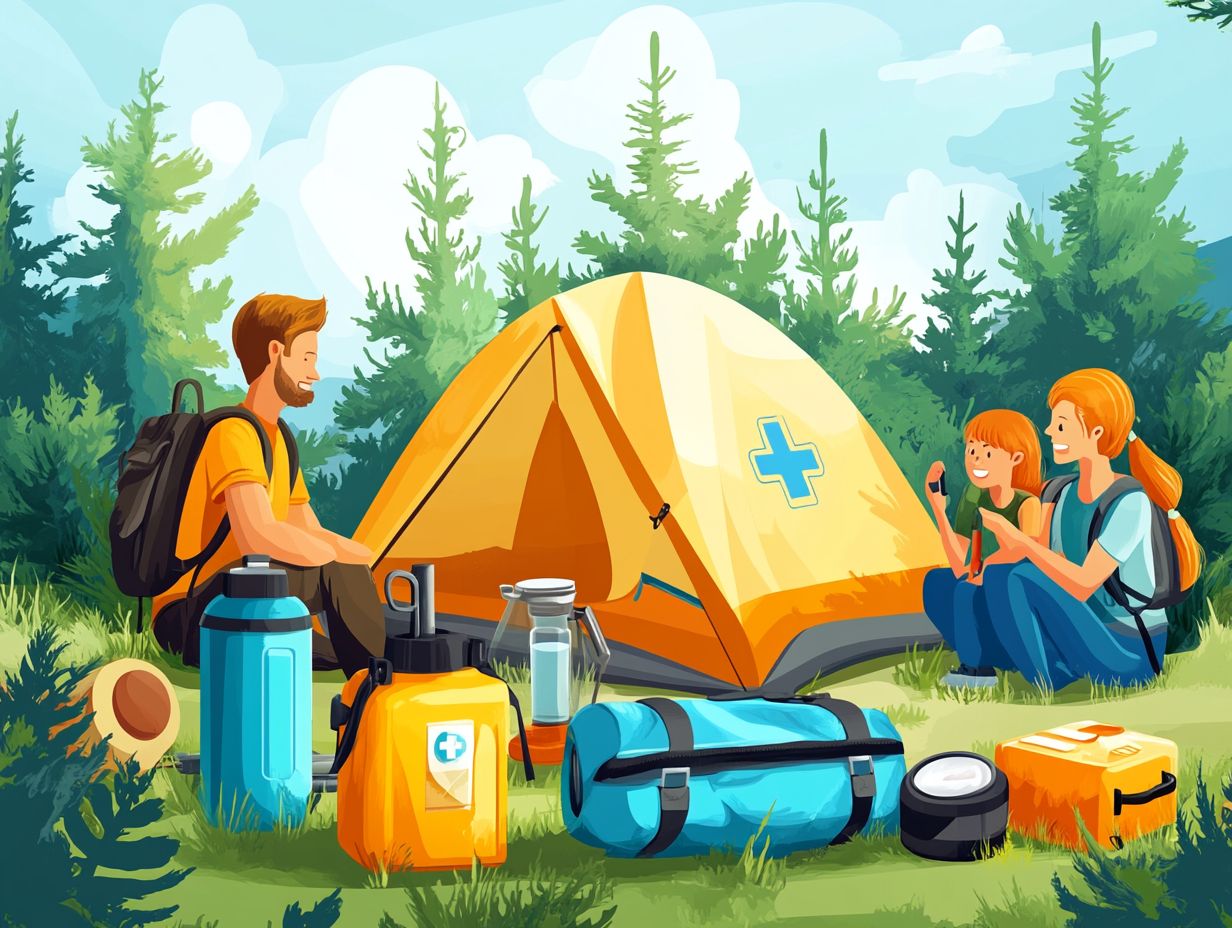
What is considered essential survival gear for family camping trips?
Essential survival gear for family camping trips includes a first aid kit, a water filtration system, a multi-purpose knife, a compass, matches or a lighter, and a flashlight. These items can help in emergencies and make the camping experience safer and more enjoyable.
Are there any specific items to consider when packing survival gear for family camping trips?
When packing survival gear, consider the age and needs of each family member. For example, infants and young children may require specific items such as diapers, formula, and baby carriers.
It’s also important to pack enough supplies for the duration of the trip, including extra food and water.
Is it necessary to pack survival gear for family camping trips even if we’re staying at a campsite?
Yes, it’s always necessary to pack survival gear for family camping trips, even if you’re staying at a campsite with amenities. Unexpected situations can occur, such as getting lost during a hike or severe weather events, where having survival gear on hand can make all the difference.
What should I look for when purchasing a water filtration system for family camping trips?
When purchasing a water filtration system, look for one that is compact, lightweight, and easy to use. It should effectively remove germs and harmful substances from the water.
Consider the size and capacity of the system to ensure it can provide enough water for your family’s needs.
Can I use my phone as a compass during a family camping trip?
While most smartphones have a built-in compass feature, it’s not recommended to rely on it as a primary navigation tool. Factors such as low battery or lack of reception can render the compass feature useless.
It’s best to bring a physical compass as a backup.
Do I need to bring a first aid kit if I’m already carrying a multi-purpose knife?
Yes, a first aid kit is still essential even if you have a multi-purpose knife. A first aid kit contains items specifically designed for treating injuries and illnesses, such as bandages, antiseptic, and pain relievers.
The multi-purpose knife may not have all the necessary tools for proper medical treatment.

